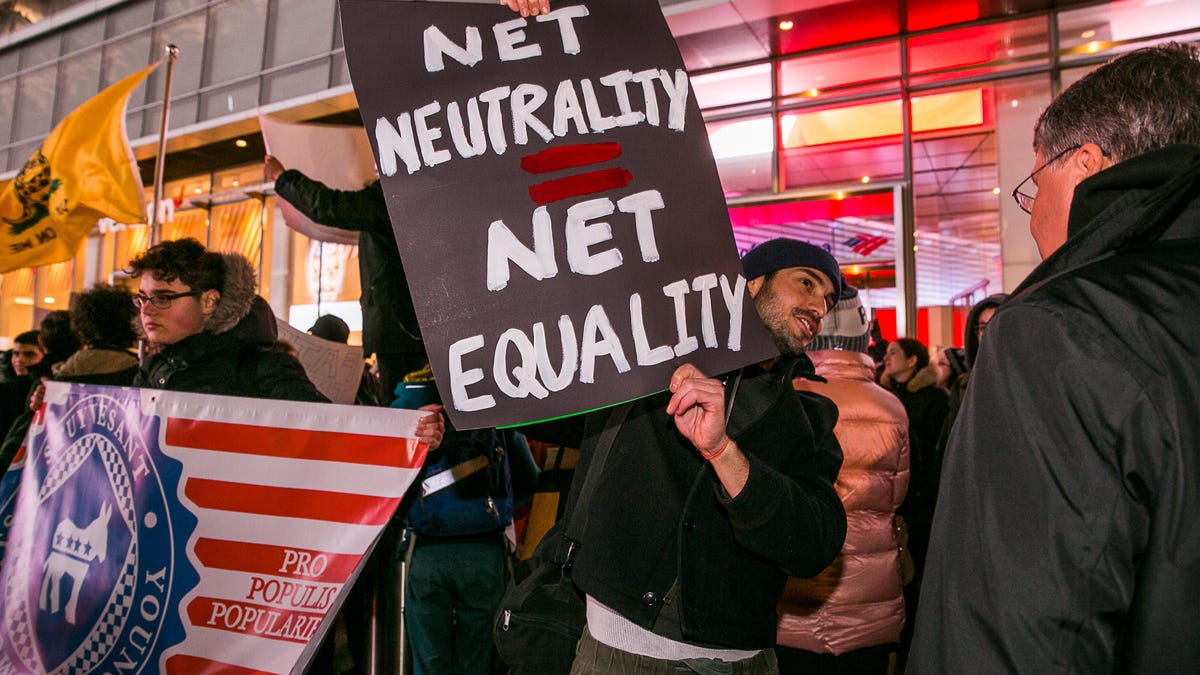Democrats force Senate vote on net neutrality repeal
Democrats reached a critical threshold of 30 co-sponsors on legislation that would reverse the FCC's rollback of popular net neutrality protections.

Senate Democrats have enough support to force a vote on reversing the Federal Communications Commission's repeal of Obama-era net neutrality regulations.
Sen. Claire McCaskill, a Democrat from Missouri, said Monday she will be the 30th co-sponsor of a bill that will use the Congressional Review Act to reverse the FCC's vote to dismantle net neutrality rules. By Tuesday 40 senators had signed on as co-sponsors. Under this law, Congress has the power to reverse a federal agency's ruling within 60 legislative days of it being made. But in order to do that, a majority in both houses of Congress must support the move, something that's unlikely in the current politically divisive environment.
"We've reached the magic number of 30 to secure a vote on the Senate floor, and that number will only continue to climb," Sen. Ed Markey, a Democrat from Massachusetts, said in a statement Monday. "Republicans are faced with a choice — be on the right side of history and stand with the American people who support a free and open internet, or hold hands with the special interests who want to control the internet for their own profit."
While Democrats have reached a crucial threshold for bringing the bill to vote on the Senate floor, it's unlikely to pass since Republicans control both the House of Representatives and the Senate.
Still, Democrats say with Republicans holding just a slight 51-49 majority in the Senate, they are confident they can persuade a few Republican colleagues to cross party lines. One such target may be Senator Susan Collins, a Republican from Maine. Collins together with fellow Maine Senator Angus King, an independent, wrote a letter to the FCC in December ahead of the vote arguing that a repeal of net neutrality regulations would hurt economic growth especially in rural areas.
Even if Democrats could muster the votes in the Senate, the House is also controlled by Republicans and the bill would still need to be signed by President Donald Trump , which seems unlikely.
That said, Democrats and net neutrality activists see the vote as important as they force Republicans to take a stand on dismantling the popular rules in an election year.
"Net neutrality will be a major issue in the 2018 campaigns," Senate Democratic Leader Chuck Schumer said at a press conference Tuesday.
Sen. Brian Schatz, a Democrat from Hawaii, said he's hopeful a new generation of voters who care about the internet will see net neutrality as their defining issue.
"People are mobilizing across the country to save the free and open internet," he said at Tuesday's press conference.
The activist group Fight for the Future has promised to rally voters for the midterm elections.
"Today's news shows that lawmakers from both parties cannot hide from their constituents on this issue," spokeswoman Evan Greer said in a statement. "Every member of the US Senate will have to go on the record, during a tight election year, and either vote to save the Internet or rubber stamp its death warrant."
The FCC voted last month to repeal rules adopted in 2015, which barred internet service providers from blocking or slowing down access to the internet or charging companies a fee to reach customers faster than competitors. Consumer advocates, internet companies like Facebook and Google, and nonprofits, including the New York Public Library, say protecting an open internet is essential to free speech and innovation. On the other side, cable operators and phone companies, like AT&T, Comcast and Verizon, say the rules went too far in treating broadband like a utility, subjecting it to decades old regulations meant for the telephone network.
The fight has become highly partisan, with Democrats in Washington and throughout the country uniting to protect net neutrality, and free-market Republicans arguing that Obama-era FCC rules were too much.
A vote in the Senate is expected after the FCC's order is published in the Federal Register, which could still take a few weeks. After that date, the Senate has 60-days in which to use the Congressional Review Act to reverse the FCC's repeal.
Special Reports: CNET's in-depth features in one place.
CNET en Español: Get all your tech news and reviews in Spanish.
This story was originally published January 8 at 1:15 p.m. PT.
UPDATED Tuesday 2:00 p.m. PT: Information was added from a press conference held on Tuesday.

